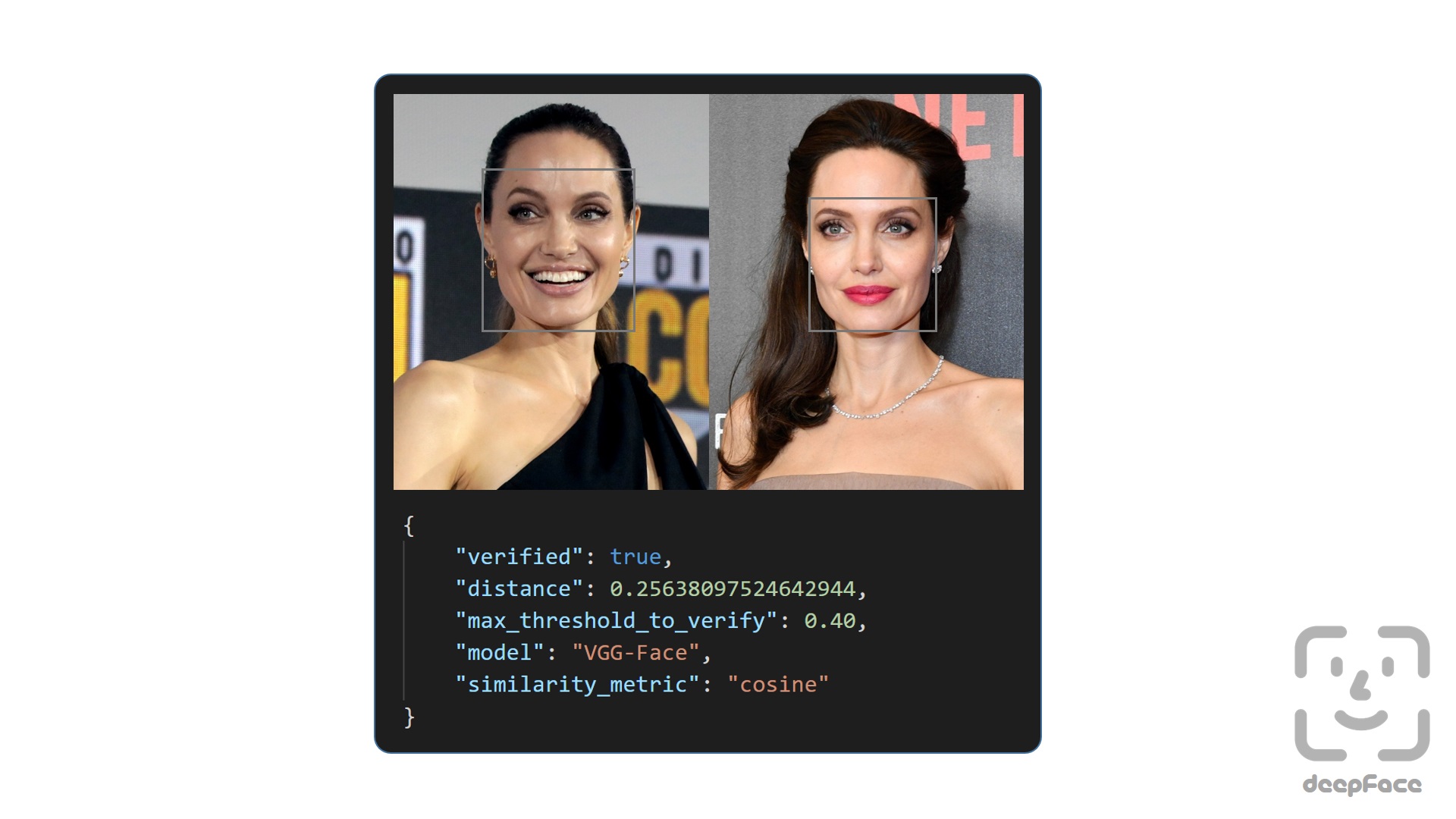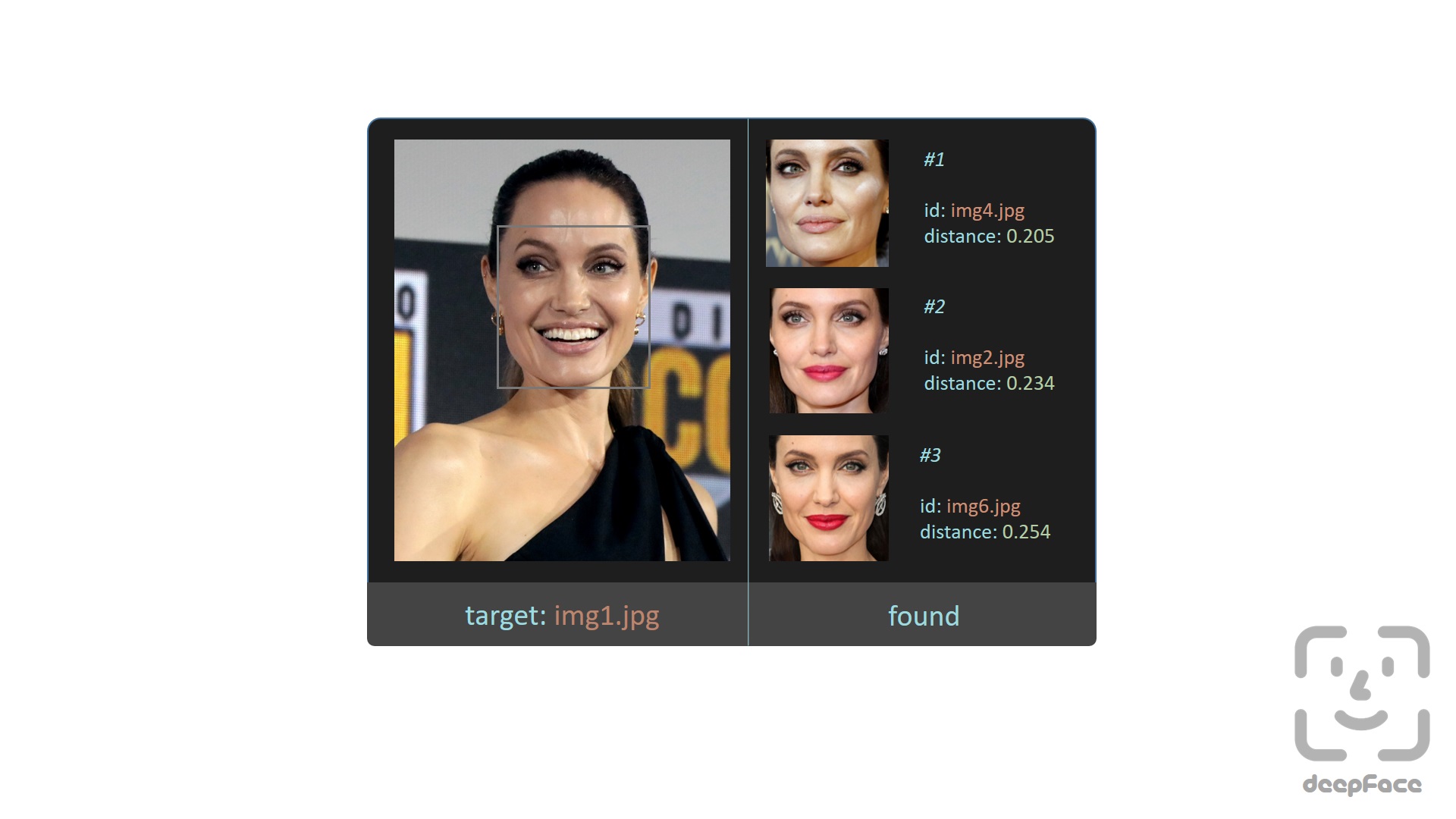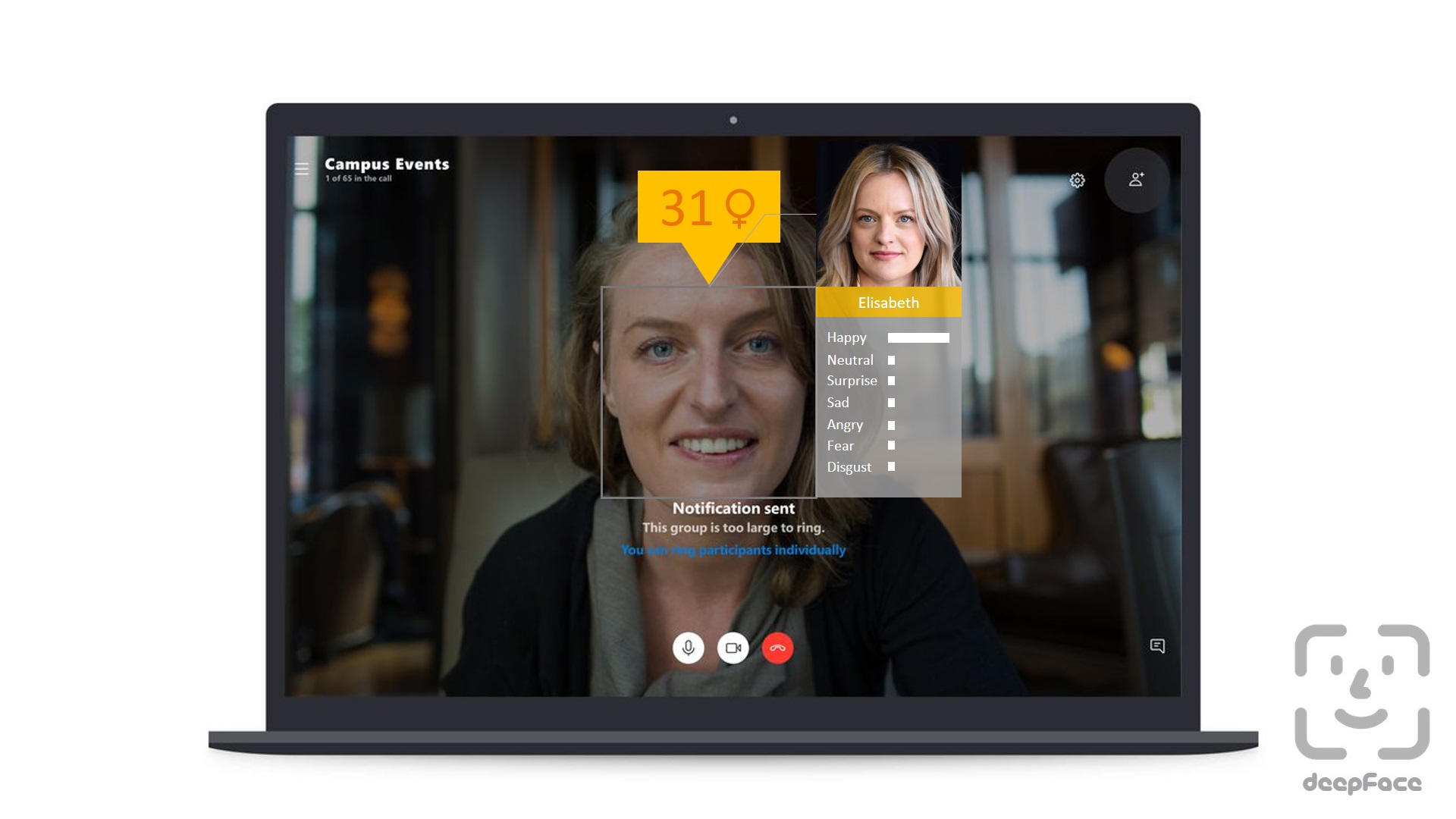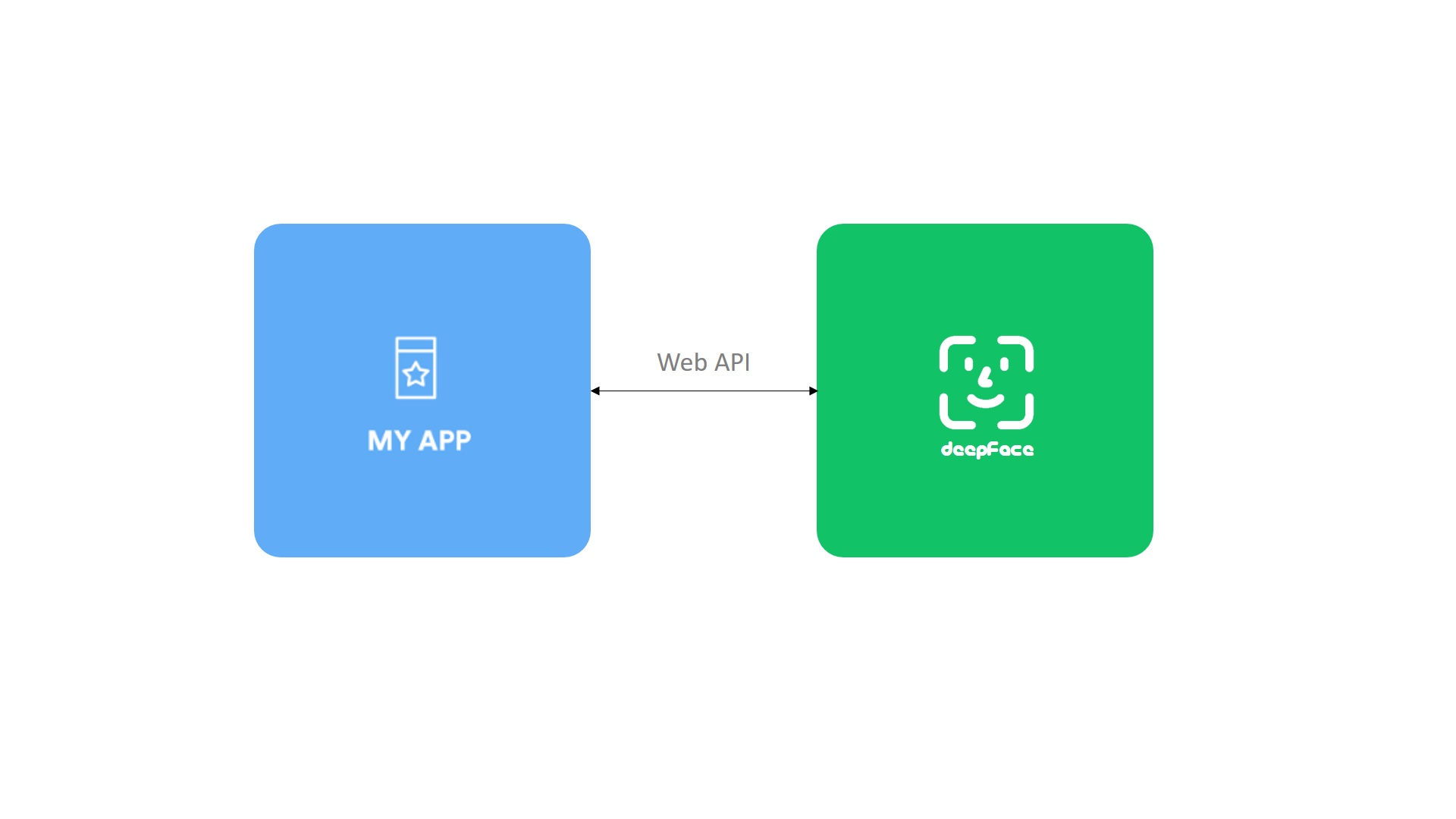A Lightweight Face Recognition and Facial Attribute Analysis Framework (Age, Gender, Emotion, Race) for Python
Project description
deepface
deepface is a lightweight face recognition and facial attribute analysis (age, gender, emotion and race) framework for python. You can apply facial analysis with just a few lines of code. It plans to bridge a gap between software engineering and machine learning studies.
Installation
The easiest way to install deepface is to download it from PyPI.
pip install deepface
Face Recognition
A modern face recognition pipeline consists of 4 common stages: detect, align, represent and verify. DeepFace handles all these common stages in the background.
Face Verification - Demo
Verification function under the DeepFace interface offers a single face recognition. Each call of the function builds a face recognition model and this is very costly. If you are going to verify several faces sequentially, then you should pass an array of faces to the function instead of calling the function in a for loop. In this way, complex face recognition models will be built once and this will speed the function up dramatically. Besides, calling the function in a for loop might cause memory problems as well.
from deepface import DeepFace
result = DeepFace.verify("img1.jpg", "img2.jpg")
#results = DeepFace.verify([['img1.jpg', 'img2.jpg'], ['img1.jpg', 'img3.jpg']])
print("Is verified: ", result["verified"])
Large scale face recognition - Demo
You can apply face recognition on a large scale data set as well. Face recognition requires to apply face verification multiple times. Herein, deepface offers an out-of-the-box find function to handle this action. Representations of faces photos in your database folder will be stored in a pickle file when find function is called once. Then, deepface just finds representation of the target image. In this way, finding an identity in a large scale data set will be performed in just seconds.
from deepface import DeepFace
import pandas as pd
df = DeepFace.find(img_path = "img1.jpg", db_path = "C:/workspace/my_db")
#dfs = DeepFace.find(img_path = ["img1.jpg", "img2.jpg"], db_path = "C:/workspace/my_db")
Supported face recognition models
Deepface is a hybrid face recognition package. It currently wraps the state-of-the-art face recognition models: VGG-Face , Google FaceNet, OpenFace, Facebook DeepFace and DeepID. The default configuration verifies faces with VGG-Face model. You can set the base model while verification as illustared below. Accuracy and speed show difference based on the performing model.
models = ["VGG-Face", "Facenet", "OpenFace", "DeepFace", "DeepID"]
for model in models:
result = DeepFace.verify("img1.jpg", "img2.jpg", model_name = model)
Similarity
Face recognition models are regular convolutional neural networks and they are responsible to represent face photos as vectors. Decision of verification is based on the distance between vectors. We can classify pairs if its distance is less than a threshold.
Distance could be found by different metrics such as Cosine Similarity, Euclidean Distance and L2 form. The default configuration finds the cosine similarity. You can alternatively set the similarity metric while verification as demostratred below.
metrics = ["cosine", "euclidean", "euclidean_l2"]
for metric in metrics:
result = DeepFace.verify("img1.jpg", "img2.jpg", distance_metric = metric)
Ensemble learning for face recognition - Demo
A face recognition task can be handled by several models and similarity metrics. Herein, deepface offers a special boosting and combination solution to improve the accuracy of a face recognition task. This provides a huge improvement on accuracy metrics. Human beings could have 97.53% score for face recognition tasks whereas this ensemble method passes the human level accuracy and gets 98.57% accuracy. On the other hand, this runs much slower than single models.
resp_obj = DeepFace.verify("img1.jpg", "img2.jpg", model_name = "Ensemble")
df = DeepFace.find(img_path = "img1.jpg", db_path = "my_db", model_name = "Ensemble")
Facial Attribute Analysis - Demo
Deepface also offers facial attribute analysis including age, gender, facial expression (including angry, fear, neutral, sad, disgust, happy and surprise) and race (including asian, white, middle eastern, indian, latino and black) predictions. Analysis function under the DeepFace interface is used to find demography of a face.
from deepface import DeepFace
demography = DeepFace.analyze("img4.jpg", actions = ['age', 'gender', 'race', 'emotion'])
#demographies = DeepFace.analyze(["img1.jpg", "img2.jpg", "img3.jpg"]) #analyzing multiple faces same time
print("Age: ", demography["age"])
print("Gender: ", demography["gender"])
print("Emotion: ", demography["dominant_emotion"])
print("Race: ", demography["dominant_race"])
Streaming and Real Time Analysis - Demo
You can run deepface for real time videos as well.
Calling stream function under the DeepFace interface will access your webcam and apply both face recognition and facial attribute analysis. Stream function expects a database folder including face images. VGG-Face is the default face recognition model and cosine similarity is the default distance metric similar to verify function. The function starts to analyze if it can focus a face sequantially 5 frames. Then, it shows results 5 seconds.
from deepface import DeepFace
DeepFace.stream("C:/User/Sefik/Desktop/database")
Even though face recognition is based on one-shot learning, you can use multiple face pictures of a person as well. You should rearrange your directory structure as illustrated below.
user
├── database
│ ├── Alice
│ │ ├── Alice1.jpg
│ │ ├── Alice2.jpg
│ ├── Bob
│ │ ├── Bob.jpg
API - Demo
Deepface serves an API as well. You can clone /api/api.py and pass it to python command as an argument. This will get a rest service up. In this way, you can call deepface from an external system such as mobile app or web.
python api.py
The both face recognition and facial attribute analysis are covered in the API. You are expected to call these functions as http post methods. Service endpoints will be http://127.0.0.1:5000/verify for face recognition and http://127.0.0.1:5000/analyze for facial attribute analysis. You should pass input images as base64 encoded string in this case. Here, you can find a postman project.
Passing pre-built face recognition models
You can build models once and pass to deepface functions as well. This speeds you up if you are going to call deepface several times.
#face recognition
from deepface.basemodels import VGGFace, OpenFace, Facenet, FbDeepFace, DeepID
model = VGGFace.loadModel() #all face recognition models have loadModel() function in their interfaces
DeepFace.verify("img1.jpg", "img2.jpg", model_name = "VGG-Face", model = model)
#facial analysis
import json
from deepface.extendedmodels import Age, Gender, Race, Emotion
models = {}
models["emotion"] = Emotion.loadModel()
models["age"] = Age.loadModel()
models["gender"] = Gender.loadModel()
models["race"] = Race.loadModel()
DeepFace.analyze("img1.jpg", models=models)
E-Learning
Deepface package for python is mentioned in this playlist as video lectures. Subscribe the channel to stay up-to-date and be informed when a new lecture is added,
Disclaimer
Reference face recognition models have different type of licenses. This framework is just a wrapper for those models. That's why, licence types are inherited as well. You should check the licenses for the face recognition models before use.
Herein, OpenFace is licensed under Apache License 2.0. FB DeepFace and Facenet is licensed under MIT License. The both Apache License 2.0 and MIT license types allow you to use for commercial purpose.
On the other hand, VGG-Face is licensed under Creative Commons Attribution License. That's why, it is restricted to adopt VGG-Face for commercial use.
Support
There are many ways to support a project - starring⭐️ the GitHub repos is just one.
You can also support this project through Patreon.
Citation
Please cite deepface in your publications if it helps your research. Here is an example BibTeX entry:
@misc{serengil2020deepface,
abstract = {A Lightweight Face Recognition and Facial Attribute Analysis Framework for Python},
author={Serengil, Sefik Ilkin},
title={deepface},
url = {https://github.com/serengil/deepface},
year={2020}
}
Licence
Deepface is licensed under the MIT License - see LICENSE for more details.
Logo is created by Adrien Coquet. Licensed under Creative Commons: By Attribution 3.0 License.
Project details
Release history Release notifications | RSS feed
Download files
Download the file for your platform. If you're not sure which to choose, learn more about installing packages.
Source Distribution
Built Distribution
Filter files by name, interpreter, ABI, and platform.
If you're not sure about the file name format, learn more about wheel file names.
Copy a direct link to the current filters
File details
Details for the file deepface-0.0.32.tar.gz.
File metadata
- Download URL: deepface-0.0.32.tar.gz
- Upload date:
- Size: 43.8 kB
- Tags: Source
- Uploaded using Trusted Publishing? No
- Uploaded via: twine/3.1.1 pkginfo/1.5.0.1 requests/2.22.0 setuptools/45.1.0 requests-toolbelt/0.9.1 tqdm/4.42.0 CPython/3.6.4
File hashes
| Algorithm | Hash digest | |
|---|---|---|
| SHA256 |
c6afb9fe62ee4f74c2ebd38225f81e844da7f923073bace52c669379981f21d5
|
|
| MD5 |
09573aadd964d1ae618747683f72d330
|
|
| BLAKE2b-256 |
94f9f4e517d224de3d71f16ed7a305a1f500e4cb81cad594f553a5f81ba32664
|
File details
Details for the file deepface-0.0.32-py3-none-any.whl.
File metadata
- Download URL: deepface-0.0.32-py3-none-any.whl
- Upload date:
- Size: 50.1 kB
- Tags: Python 3
- Uploaded using Trusted Publishing? No
- Uploaded via: twine/3.1.1 pkginfo/1.5.0.1 requests/2.22.0 setuptools/45.1.0 requests-toolbelt/0.9.1 tqdm/4.42.0 CPython/3.6.4
File hashes
| Algorithm | Hash digest | |
|---|---|---|
| SHA256 |
277241187610bf391c12ff93b5089423dbdbad414df1ac71c4b4544af94196e6
|
|
| MD5 |
cf3b1b667add619f0477a8387bf8503f
|
|
| BLAKE2b-256 |
98f01f960885fff997ee52316639ea28562a753d77ab7196807c62aaecb0ac2e
|




















